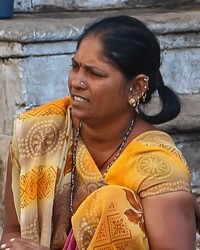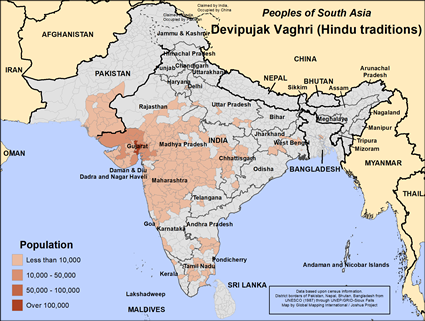Devipujak Vaghri (Hindu traditions) in Pakistan

Photo Source:
Bernard Gagnon - Wikimedia
Creative Commons
|

Map Source:
People Group data: Omid. Map geography: UNESCO / GMI. Map Design: Joshua Project.
|
| People Name: | Devipujak Vaghri (Hindu traditions) |
| Country: | Pakistan |
| 10/40 Window: | Yes |
| Population: | 43,000 |
| World Population: | 609,000 |
| Primary Language: | Sindhi |
| Primary Religion: | Hinduism |
| Christian Adherents: | 3.34 % |
| Evangelicals: | 0.00 % |
| Scripture: | Complete Bible |
| Ministry Resources: | Yes |
| Jesus Film: | Yes |
| Audio Recordings: | Yes |
| People Cluster: | South Asia Hindu - other |
| Affinity Bloc: | South Asian Peoples |
| Progress Level: |
|
Introduction / History
The Devipujak Vaghri (a Scheduled Caste in India) are said to have derived their name from the Sanskrit wagura, meaning a net; and Vagri are said to have gotten this name because many Vagri were professional hunters. Vagris are further divided into five main sub-castes. During the Colonial period, Vagri were listed under the Criminal Tribes Act, 1871, as being a tribe "addicted to the systematic commission of non-bailable offences." They suffered greatly because of this decision and are still suffering the consequences.
What Are Their Lives Like?
In Pakistan, they are landless and have been subject to discrimination at the hands of the locally powerful Sodha Rajput community.
What Are Their Beliefs?
Like those in India, the Pakistan Devipujak Vaghri are Hindu. Some are devotees of a specific Hindu god, while others are more philosophical in their spiritual lives.
What Are Their Needs?
Lack of workers is an obstacle to the advance of the gospel in all nations of the world, but especially so in Pakistan.
Prayer Points
Pray for improved employment opportunities for the Devipujak Vaghri community, and for rapidly rising literacy rates, especially among the youth.
Pray for many to look to the empty grave and understand God's provision for their lives.
Pray for a powerful movement to Christ among the Devipujak Vaghri people.
Pray that many Devipujak Vaghri people will download and listen to gospel materials and that the Holy Spirit will give them understanding.